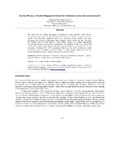| dc.contributor.author | Moalosi, W.T.S. | |
| dc.date.accessioned | 2012-11-15T13:49:53Z | |
| dc.date.available | 2012-11-15T13:49:53Z | |
| dc.date.issued | 2012-09 | |
| dc.identifier.citation | Moalosi, W.T.S. (2012) Teacher efficacy: is student engagement essential in Botswana junior secondary schools?, International Journal of Scientific Research in Education, Vol. 5, No. 3, pp. 207-213. | en_US |
| dc.identifier.issn | 1117-3259 | |
| dc.identifier.uri | http://hdl.handle.net/10311/1054 | |
| dc.description.abstract | This paper discusses student engagement in learning in junior secondary schools classes. Concern has been raised on the declining performance of students in junior secondary schools. The 2009 junior certificate results are a testimony to this concern. This paper investigates the response of Botswana junior secondary school teachers on three subscales, the Teacher Sense of Self Efficacy scale (TSES), efficacy in student engagement, instructional strategies and classroom management. The findings of this study suggest that teachers do not fully engage students in learning activities. Data was collected using a survey instrument administered to 1006 participants. Based on this study, decline in student performance can be linked to teachers failing to fully engage students in learning. Recommendations on how to engage students in learning are offered. | en_US |
| dc.language.iso | en | en_US |
| dc.publisher | IJSRE, http://www.ijsre.com | en_US |
| dc.subject | Student engagement | en_US |
| dc.subject | Classroom management | en_US |
| dc.subject | Instructional strategies | en_US |
| dc.subject | Teachers' sense of efficacy | en_US |
| dc.subject | Teacher efficacy | en_US |
| dc.subject | Instructional self-efficacy | en_US |
| dc.title | Teacher efficacy: is student engagement essential in Botswana junior secondary schools?. | en_US |
| dc.type | Published Article | en_US |
| dc.link | http://www.ijsre.com/Vol.,%205_3_-Moalosi.pdf | en_US |

